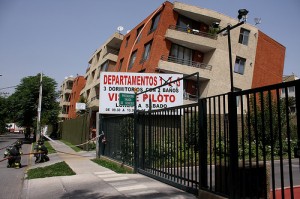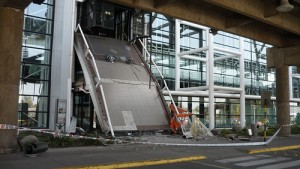On March 11, Sebastián Piñera will be sworn in as the new President of Chile [1], replacing the current president Michelle Bachelet. The presidential transition will take place [2] despite the earthquake, and political observers—criticized by some who think this is not the time to analyze politics—have begun searching for political implications to the disastrous events of the weekend.
Blogger and university professor Patricio Navia [es] [3] begins his post by saying that Sebastián Piñera will come out of this catastrophe as the political winner:
Ningún gobierno aspira a enfrentar un desastre natural mientras está en el poder. Pero si se pudiese escoger el momento para un devastador terremoto, el comienzo del periodo -o justo antes de asumir- es preferible a los últimos días de mandato. En ese sentido, Piñera tiene mucho más que ganar políticamente que Bachelet. Aunque los errores que cometa Piñera en estos días también le pesarán más que los traspiés en que incurra el saliente gobierno […]
A su vez, como no ha asumido el poder, a Piñera nadie lo hará responsable de los desaciertos, atrasos y errores de la respuesta estatal inmediata. Ya que la reconstrucción comenzará durante su mandato, él hará los anuncios de nuevas obras y también las inauguraciones posteriores.
No government aspires to face a natural disaster while in office. But if one could pick the moment for a devastating earthquake, the beginning of the presidential term –or just before being sworn in- is preferable to the last days of governing. In this sense, Piñera has a lot more to win politically than Bachelet. Even though the errors Piñera commits in these days will also weigh on him more than the slip-ups of the departing administration […]
At the same time, since he hasn't been sworn in, no one will hold Piñera accountable for the mishaps, delays, and errors of the immediate response from the State. Since the reconstruction will begin during his term, he will announce the new projects and their inaugurations.
He concludes that if the current president and the president-elect honestly collaborate in their efforts, then both can gain politically:
Si colaboran, Bachelet cerrará su gobierno brillantemente y Piñera iniciará el suyo con el pie derecho. Si en cambio compiten por el liderazgo, ambos saldrán perjudicados.
 [4]
[4]Apartment Buildings in Maipu, Santiago. Picture uploaded by flickr user Raponchi and used under a Creative Commons license.
This analysis didn’t sit well with many readers that considered Navia to be out of touch in presenting a political spin during such a tragic time for Chile. Carlos García commented on Navia’s blog post by saying:
Creo que es un gran error sacar cuentas cortas del oportunismo político que puede generar una catástrofe de este tipo. Hoy hay Chilenos desaparecidos, gente sepultada aún con vida y más de un millon de Chilenos perdieron sus hogares y que en lo último que piensan es sobre que político podría beneficiarse.
A few users defended the blog post, like user Carlos who wrote:
Creo que es una vision realista de lo que pasa. Lamentablemente asi es la politica y no me cabe duda que los comandos politicos han hecho estas evaluaciones. Los que estan rasgando vestiduras no conocen la naturaleza humana y menos a los politicos.
Juan Francisco Coloane wrote a blog post titled “The Politics of Nature” [5] [es] where he says that in spite of what critics may say, this earthquake proves that nature affects politics:
En la “hermandad política” de coadministradores del sistema, cualquier divergencia anterior pasaba a segundo plano.
La naturaleza con su terremoto se convertía en el agente más político, sin diseño previo y como factor inesperado. Es la especial política de la naturaleza que no está en los manuales políticos. […]
Entonces la premisa de que “la política de la naturaleza es apolítica” no es cierta.
In the “political brotherhood” of co-administrations of the current system, any previous divergence falls to second place.
Nature, with its earthquake has become the greatest political agent, without previous design and as an unexpected factor. It is the special politics of nature that are not found in political handbooks.
So the premise that “the politics of nature is apolitical” is not true.
This post received more assertive comments, like from Carlos Alberto who said:
Excelente columna. El gobierno debe seguir trabajando y acelerar sus decisiones y acciones. El futuro gobierno coordinarse y apoyar en vísperas de heredar el problema
 [6]
[6]Damage at Santiago's Airport. Photo uploaded by flickr user Jorge Barahona and used under a Creative Commons license.
Pedro Jesus Teruel [es] [7] wrote on his blog that he is hopeful that the new administration will implement the necessary measures to help Chile:
Tras las elecciones que han dado la victoria a Sebastián Piñera, en un contexto de alternancia caracterizado por una admirable normalidad democrática, la nueva orientación política aportará renovaciones estructurales ahora espoleadas por la urgencia. Será el 11 de marzo cuando se inicie la nueva legislatura, marcada ya por el azote inesperado del temblor.
Twitter users also commented on the politics related to the earthquake and the presidential transition. Some users like Elizabeth Tapia [8] (@feelemotion) from Santiago, Chile echoed the comments on Navia’s blog post:
No falta la gente que todo lo toma como campaña politica. En estos momentos Chile se debe unir, no pensar en partidos. Solo solidaridad.
Others where more analytical about the situation, like Fernando Galaz [9] (@fernandogalaz) from Miami, Florida:
La llegada de Piñera al gobierno será como un partido de futbol que comienza perdiendo 5-0, se viene mucho trabajo
Whether Bachelet or Piñera are to gain any political advantage from this devastating event is yet to be seen; meanwhile because of the quick messages that can be sent through social media, we can expect plenty of political comments despite critics disputing their place in the conversation about Chile’s recent tragedy.